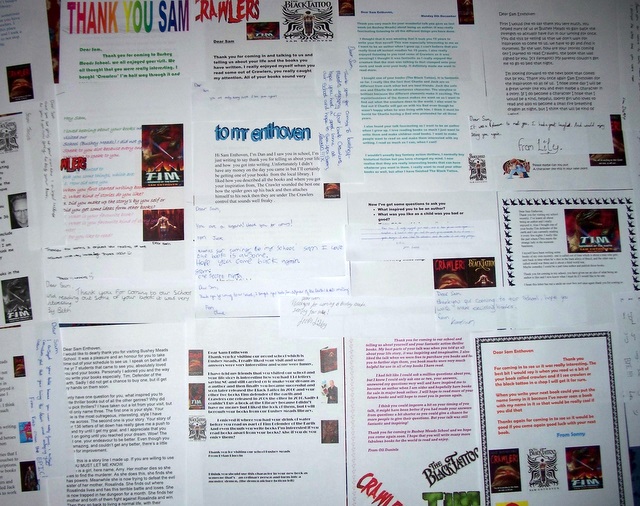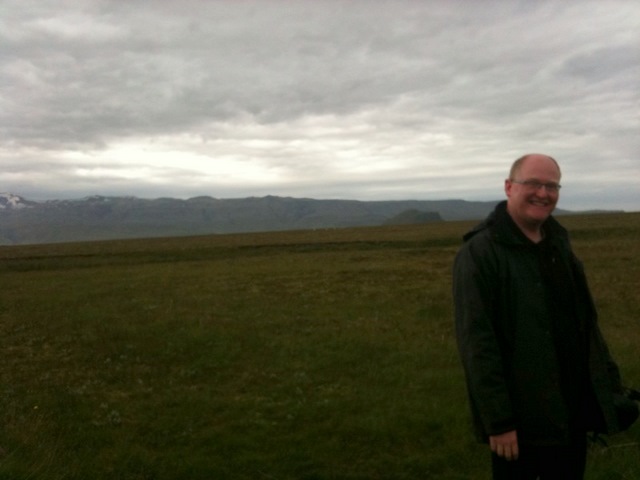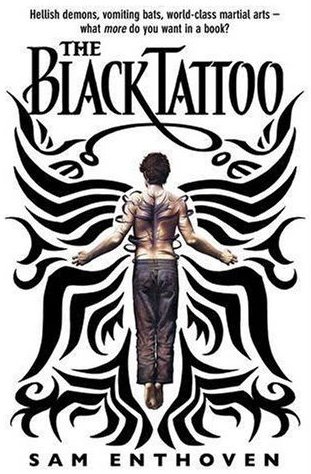Just before Christmas I received a parcel containing masses of wonderful letters from students at the last school I visited, Bushey Meads.

Some of these letters contained questions for me. Here those questions are below, with my best attempts at answers. ;D
From Chloe K.: What inspired you to be an author?
What inspired me to write – and still inspires me – is how utterly amazing and thrilling and moving and brilliant the experience of reading a great book can be.
What made me decide to give being an author my best shot is that life is short and fragile. If you have something you want to do, no matter how mad it might seem, it’s best to get on with it.
What were you like as a child? Were you bad or good?
I’m sorry to say I was good: quiet, polite, hardworking, serious-minded and well-behaved – sickening, really. I’ve made up for it since. ;p
If you didn’t want to be an author what would you like to be?
Before deciding to be an author I had a go at being an internationally famous rock guitarist. Though I still play and have fun, that ambition didn’t work out so well. ;D
Did you write any stories when you were a child?
Yes, I did. As well as the ones I was told to write for school, I sometimes used to write stories of my own in my spare time. My favourite subjects for stories were space battles, monsters, murder mysteries, chases, magic and monsters. As I got older there was a while when I decided that perhaps those weren’t suitable subjects to write about somehow, even though I love them. But then, I’m happy to say, I came to my senses.
From Esther A.: What inspired you to write thriller books out of all the other genres? Why did you pick thrillers?
I write the kinds of books I most love to read. I honestly think that’s the best way to do it. It might not be thrillers for you, but ask yourself: What sort of story would wrap you up in it so tightly that you might forget to eat or sleep while you’re reading it? What sort of story would that be for you, personally?
When I sit down to start thinking about a new book the first thing I think about is what sort of book I would most love to read. Sometimes I make a list of what the elements might be (that’s how I started The Black Tattoo). Then, once I’ve planned the story as far as I can, I write it.
Don’t worry about genre too much. If you’re a writer, what genre you are is best left to other people to argue over if they want. Your job is to get on with writing the best stories you can think of.
From Joe: How old were you when you first started writing books?
I first tried to write a book when I was nine, with another guy at school. It was called The Jaws of Death. We wrote a whole chapter before we had to admit to ourselves that it was exactly the same as Star Wars: A New Hope – and I mean word for word. I guess that one doesn’t count. ;D
I was twenty-one when I made my first big attempt to write a novel. I first finished a novel (a different one, btw) when I was, I think, twenty-four. I wrote two more novels after that one, but they weren’t good enough either. I was still learning my craft. I kept going. By the time my first published novel The Black Tattoo came out (September 2006) I was thirty-two.
From Eliza Q.: How long did it take you to make your books?
Crawlers took two years. So did Tim, Defender of the Earth. The Black Tattoo took five years.
What is your favourite book you have written?
I try to put all my passion and enthusiasm and commitment into every book I write – and as I say, each one takes a big chunk of my life in terms of the time involved in writing it. I can’t say which of my books is my favourite. I’m so close to each one that it’s impossible for me to choose between them.
Back to Joe: Did you make up the stories by yourself or did you get some ideas from other books?
I don’t believe it’s possible to make up stories completely by yourself. Every story contains ideas from other stories that came before it. That’s why it’s so important to read (and live) as widely as you possibly can. Don’t steal other people’s ideas hoping for their success. But do fill your stories with things that you, personally, would most love to find in a story. Originality isn’t in the ideas themselves, it’s in their mixture – the special blend of influences and enthusiasm and passion that only you can bring to a project.
From Dylan L. (and Joe): Do you read books apart from your books? Do you enjoy them?
Definitely. I love all kinds of storytelling – films, games, comics, animation, theatre, whatever – but books are my obsession. To me, reading is one of the best things about being alive. I read first thing in the morning while I’m cleaning my teeth, I read last thing at night before I fall asleep and in between, I read any other chance I get. I came to writing because of how much I love reading: reading came first. If you want to know what I’m reading now and find out my favourites check my LibraryThing profile, here.
From lots of students: Here’s a character / idea – can you put it in one of your books?
I loved reading your ideas. The thing is, though, they’re your ideas. I wish you the best of luck with them, but I’m happy working on my own ones.
Can I be in one of your books?
Are you sure you would want to be? What if you didn’t like the way I wrote you?? Besides, you might not be right for the story. I prefer to mix my characters together using pieces I take from everyone I’ve ever met. So: while it’s possible that a part of you might make it into one of my books, I’m sorry but I can’t possibly accept all of you. 😉
How are your stories coming on? Are you working on another book?
HELL YES! I’ll give you an update in my next blog post. 😀
A big THANK YOU to all my correspondents from Bushey Meads School, including (as well as the names I’ve mentioned above) Isabel, Danielle C., George P., Jessica D.F., Charlotte D., George T., Beth, Lauren, Eloise, Marco F., Emily, ‘The Secret Ninja’, Oliver P., Jack, Taylor W., Olivia, Kristian, Lily, Libby, Luke, Jacob, Ross O. ‘The Epic’, Danny, Taylor M., Shea J., Matt B., Nick W., Kate S., Chris B., Maria C., Chelsea F., Danyaal M., Ben S., Nathan R., Harry L., Dan, Adam G., Jake E., Oli D., Sonny, Laura M., Kristy T. and Ben H.
I was touched and thrilled by your kind words about my visit and my work, and I really appreciate your taking the time to write to me. Thank you again.
-Sam








